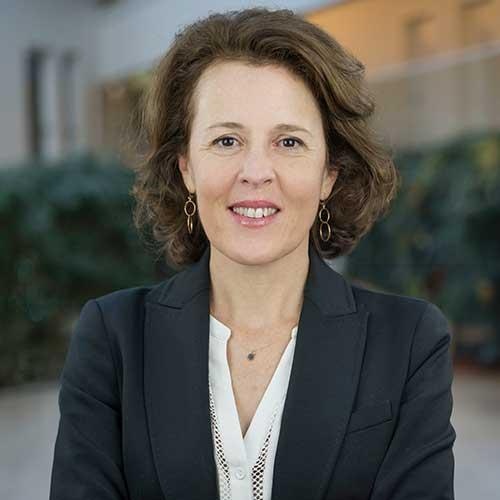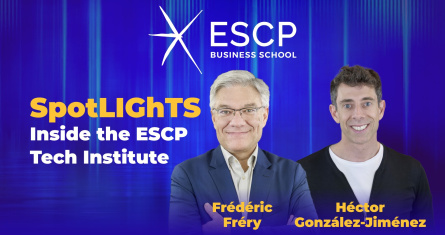Rethinking Leadership: Inside ESCP's Leadership and Inclusive Management Institute
As diversity, equity, and inclusion (DEI) initiatives face mounting scrutiny in various global contexts, ESCP Business School has chosen to deepen its engagement with these themes. At the centre of this commitment is the Leadership and Inclusive Management Institute (LIMI), one of five institutes created under the LIGhTS framework—ESCP’s strategic platforms for addressing major societal and economic challenges. These institutes bring together faculty expertise and external partnerships to generate research that informs decisions, shapes policy, and supports transformation in business and society.
From Academic Silos to Collective Action
“One of the founding ideas behind LIMI was to make our work more visible—both within ESCP and beyond,” says Professor Géraldine Galindo, Director of the Institute. “There are many researchers across our campuses who are working on these topics. We wanted to build an ecosystem that connects their research and translates it into real-world impact.”
There are many researchers across our campuses who are working on these topics. We wanted to build an ecosystem that connects their research and translates it into real-world impact.
 Géraldine Galindo
Géraldine GalindoProfessor, ESCP Business School
That ecosystem now includes a growing roster of initiatives. The Invisible Identities Project explores non-visible dimensions of identity—such as neurodivergence, mental health, and religious affiliation—while the Religious Diversity Study develops inclusive practices around belief expression at work. The Workplace Wellbeing Initiative focuses on psychological safety and mental health, and the Women in Finance Chair, co-led by Professors Almudena Cañibano and Marion Festing, investigates persistent barriers to gender inclusion in the financial sector.
Other LIMI-affiliated work addresses how different facets of diversity such as gender, sexuality, social background, and culture shape both access to opportunity and the experience of navigating professional environments; while the Reinventing Work Chair examines how the workplace is evolving in response to remote work, digital transformation, and changing expectations around flexibility. Each of these projects shares a common aim: to give structure, depth, and empirical grounding to issues often discussed through slogans or surface-level narratives.
Pushing the Boundaries of Inclusion Research
Géraldine, a recognised expert in religious diversity and workplace identity, has long championed subjects that were once considered marginal in business education. “Back in 2009, when I started researching religion in the workplace, it was almost taboo in French management studies,” she recalls. Today, she is leading efforts to investigate how religion, mental health, and neurodivergence intersect with perceptions of competence, belonging, and leadership potential.
Recent work under LIMI explores how religious identity can either reinforce or mitigate impostor syndrome—a nuanced take on what it means to feel like a fraud in environments that reward conformity.
The Institute is also examining how structural hiring practices, such as employee referral schemes, may inadvertently exclude neurodivergent candidates.
Through projects like Identity at Work, the team is also gathering data directly from students to inform research and institutional practice.
The Classroom as a Site of Transformation
For Géraldine, research and education are inseparable. “I believe education is not just about transmitting knowledge, but about creating space for self-reflection,” she explains. Her courses challenge students' assumptions, encouraging them to interrogate their own biases and understand the structures that shape organisational life.
This extends to how leadership itself is defined. In a recent ESCP Impact Paper co-authored with postdoctoral researcher Zuzanna Staniszewska, Géraldine explores how artificial intelligence is reshaping leadership roles—not eliminating them, but transforming them. “The leaders of tomorrow won’t be charismatic figureheads,” she says. “They’ll be ethical mediators, systems thinkers, and guardians of alignment between human values and technological tools.”
Rethinking Inclusion for the Long Term
In a time when diversity policies are under increased political scrutiny, LIMI offers a steady platform for constructive engagement. The Institute works to shape long-term thinking—through partnerships with companies, student-facing programmes, and public scholarship.
“We’re here to introduce complexity, to ask difficult questions, and to help organisations think more critically about what inclusion really means."
This work also demands a shift in how leadership itself is understood. “Inclusive leadership starts with searching within,” says Géraldine. “You need to confront your own blind spots, your assumptions—that’s what allows you to recognise and elevate profiles that don’t fit the dominant mould."
These are not just ethical imperatives but practical leadership skills for navigating plural workplaces. By centring intersectional perspectives—religious, cognitive, social, and beyond—LIMI aims to expand the definition of who gets to lead, and how.
We’re here to introduce complexity, to ask difficult questions, and to help organisations think more critically about what inclusion really means.
 Géraldine Galindo
Géraldine GalindoProfessor, ESCP Business School
The Legacy LIMI Hopes to Build
Looking ahead, Géraldine hopes to anchor LIMI more deeply in both the academic and professional landscape. “My goal is to ensure LIMI becomes a lasting part of ESCP’s identity—not a passing initiative, but a reference point,” she says. Part of that vision includes creating research outputs that serve as benchmarks for practitioners: nuanced, evidence-based materials that companies can actually use.
For students, the message is equally clear. “Whatever your role—in finance, marketing, operations—you will be managing human beings. And that means leading inclusively is not optional,” Géraldine insists. “It’s not a side topic. It’s a core leadership skill.”
*This article draws on a conversation with Professor Géraldine Galindo, held in July 2025.
Campuses

